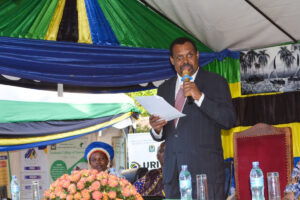Tanzania Communications Regulatory Authority (TCRA) has been playing a ‘policing role’ by banning online media outlets accused of violating regulations.
Mr Nnauye said the regulator should remain guardian of the entire communication sector in the country to ensure its growth and contribution to building the digital economy.
“TCRA does not enforce, it is not allowed to conduct any seizures even when there appears to be an obvious cybercrime. Their duty is to conduct cyber analysis and provide feedback to relevant law enforcement agencies,” he said during an interview with a local channel on Monday.
“TCRA feedback enables other agencies to identify who is who and what is being done in the space,” he added.
The minister said one of the duties of the communications regulatory body was to analyse user information and provide feedback to the law enforcement agencies like the police who are tasked with combating cybercrimes and other vices that occur in the online space.
He underlined the need for every person using online services to make it responsibly and safely.
“Whatever you publish in the online space leaves a mark, the internet doesn’t forget. I’ve seen some people missing out important opportunities only because of what they have been posting in their particular online spaces,” he said.
Mr Nnauye emphasised that TCRA needed to concentrate on educating communication service providers rather than punishing them, particularly in situations where it discovered they violated the regulations.
“I have reminded them to work as the sector’s guardian. We have reminded one another that if the service provider makes a mistake, consult them, talk to them, instead of prioritising penalties as it used to be,” he added.
In 2019, TCRA slapped telecommunications companies with a fine totaling Sh5.9 billion for failing to adhere to rules on quality of services and later in 2020, it also slapped Wasafi FM radio with a seven-day ban, accusing the station of violating communication regulations by airing abusive language.
Last year, the regulator fined six mobile phone companies a total of Sh38.1 billion over failure to meet service quality standards.
Share this news
This Year’s Most Read News Stories

Zanzibar liquor importers face fresh hurdle despite court order
The liquor shortage in Zanzibar is far from over, even after a court order granted relief to the three importers.Continue Reading

Cracks show as Zanzibar’s CCM ruling party looks to 2025 polls
Cracks show as Zanzibar’s CCM ruling party looks to 2025 polls over Mr Karume’s allegation against the administration. Time for the ruling party to take stock?Continue Reading

Karume faults lease of Zanzibar Islets
Diplomat Ali Karume has faulted the decision by the revolutionary government of Zanzibar to lease the islets that surround the islands of Unguja and Pemba to private developers saying it was absolutely not in Zanzibar’s national interests.Continue Reading











